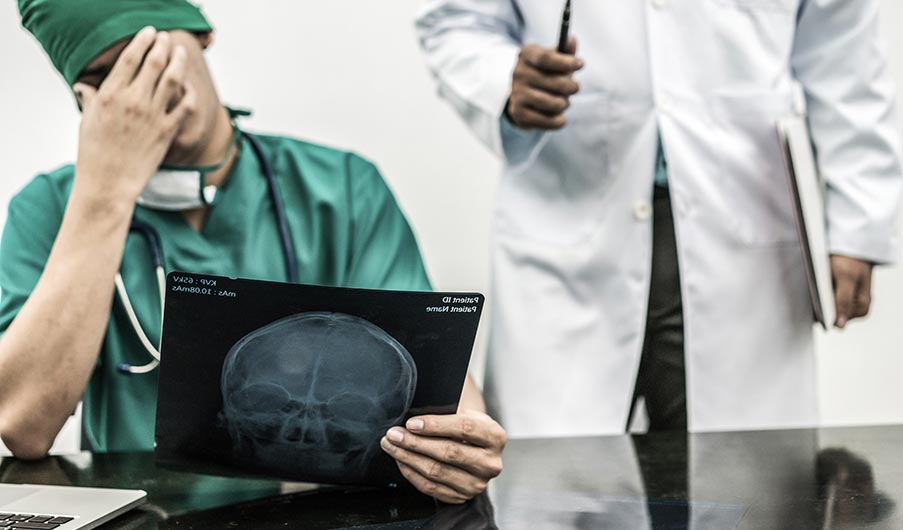Miami
Hialeah
Houston
- (305) 261-7000
- HABLAMOS:
 Español
Español
 Español
Español

When receiving a surgical procedure, you and your loved ones surely expect the best possible care and results. Unfortunately, that is not always the case. Medical professionals sometimes make mistakes in the operating room that can deeply affect the life of the patient and their families. If you have been a victim of surgical error, it is important that you speak to an attorney and figure out your next step.
A surgical error is when a surgeon fails to provide the appropriate amount of care to the patient by making mistakes that can cost the patient their health and even their life. While there are risks involved in surgery of injury, it is the doctor's responsibility to avoid hurting the patient and provide satisfactory results. There are various forms of surgical errors and what causes them so it is important to note the details of your situation. Knowing this information can assist your attorney in the development of your case.
While risks are understood to be involved in most surgical procedures there are factors that heavily influence the likelihood of surgical error and injury to the patient. Some of these include:
Although negligence may not always be the cause of surgical errors, it is important to identify if it is. If the surgical staff is responsible for injuries and death in a surgical procedure, legal compensation is attainable. Speaking to an attorney can clarify if your case is one involving medical negligence.
We trust medical professionals with our health whenever we agree to undergo a surgical procedure. While many providers ensure the best results, others can commit errors due to negligence. There are many types of surgical errors that can be dangerous and potentially fatal. Some of the most common are the following:
These mistakes occur everyday and they can permanently alter the life of a victim and their family. If you have suffered from any of these errors, our team can help you understand how to move forward and receive compensation.
In the state of Florida, as a patient that has been a victim of surgical negligence, you have the the right to file a malpractice claim against the medical professionals involved in your procedure. Before filing your claim you would have to provide a notice and go through a presuit screening. Additionally, the statue of limitations on medical practice in Florida is two years after the discovery of the damages.
The exceptions of this would include claimants under the age of eight and an extension of a maximum 7 years for cases that involve fraud, concealment or intentional misrepresentation by a prospective defendant health care provider. However, with two years being the window of time for most cases, it is crucial to review your case with legal representation as soon as the injury or damages have been discovered.
You can receive compensation for economic and non-economic damages. Some of thee include:
As compensation varies per situation, damages would be calculated after a careful review of your case and it's details.
If you or a loved one believe you have been in involved in a case of surgical error there are a couple steps you can take to ease the process of creating a successful claim:
You must begin by communicating your concerns with your healthcare provider and requesting an investigation of the accident. After you have done this, you can begin gathering evidence by requesting medical records, diagnostic tests, surgical notes, photographs, anesthesia record and more. Contacting a Surgical Error Attorney is crucial as they can help you navigate this investigatory process and assist you in gathering witness statements. Additionally, we will provide you the legal support and advice you need to build your claim against a healthcare provider.
At Gallardo Law Firm, we have assisted numerous individuals that have suffered from terrible medical injustices like your own. Our seasoned surgical negligence attorneys would love to have an initial consult with you and answer all of your questions. If you intend to pursue a claim against the medical professionals involved in your procedure, we would begin a case evaluation and investigation.
This would entail a full review of all of the documents that can be used as evidence to prove the physician's negligence. We would further investigate by acquiring witness testimonies and proving that the errors in surgery caused your injuries and damages. We would then continue building your claim and enter a negotiation and pretrial litigation period where we would inform you of every decision and offer presented before we enter court. Our team will work closely with you in this process and ensure you succeed in receiving the compensation you deserve.
If you or a loved one have suffered from negligence in a surgical procedure, do not hesitate in contacting one of of Miami Surgical Error Attorneys at Gallardo Law Firm in Miami and Hialeah. Additionally, you can call us at (305) 261-7000 if you have any questions or would like to set up an initial consultation.